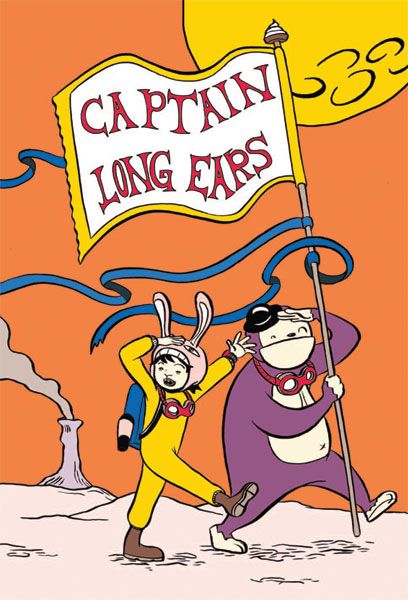This book surprised me in more ways than one. It's a story we've all seen -- or maybe even lived -- before. This is delivered as a coming of age tale where the protagonist must set aside his childish ways and dreams, but just can't let go.
Captain Long Ears -- an imaginative eight-year-old boy whose real name is Michael -- and his partner-in-fun, Captain Jam, set out to find the long-missing Captain Big Nose. Long Ears is dubbed so due to the rabbit costume he wears, complete with a headpiece that has long ears. Captain Jam, however, is a stuffed gorilla, not much bigger than a common teddy bear, but when fueled by Michael's imagination is life-size and capable of helping Michael do great things. At least great things within the landscape of Captain Long Ears' fertile imagination.
The story here is deceptively long, weighing in over one-hundred-fifty pages, but it moves quickly. At first blush, it seems like an interpretation or homage to "Calvin & Hobbes," but this story quickly distinguishes itself.
The story crosses back and forth between Captain Long Ears' imagination and the real world, letting us see things both as Long Ears sees them and also as they are. Thung handles this incredibly well, even going so far as to set up panels side-by-side for comparison's sake.
As experienced Space Ninjas, Captain Long Ears and Captain Jam decide that the best place to take their search for Captain Big Nose is to Space Ninja Headquarters. Through the detached lens of readership, we see Headquarters for what it is: Happy Land, an amusement park. The accoutrements of Happy Land easily translate to the wild imagination of Captain Long Ears, from the Ferris wheel becoming a prison to other visitors and staff of Happy Land being transformed into monsters and aliens.
The turning point of this story comes in the form of a wooden crate. More appropriately, it comes in the form of a mystery within said crate. Through their adventures, Long Ears and Jam learn that the mystery is really a baby elephant. Dedicated to doing what's right, the pair set to the task of liberating the elephant.
Through it all, Michael's mother is distant and busy, which is what sets the story in motion. All too often the news carries tales of children left unattended or unloved. That is the initial feeling I got at the beginning of this story, but as Michael's mother begins searching for him, I came to realize that she was too busy to abandon Michael, but busy enough where she didn't express her affection for him enough.
The story of how the elephant (who, by the way is not Captain Big Nose) and Michael come to meet is an intriguing parallel that Thung plays up to full advantage. Both "motherless children" are out of their minds with grief and desperately in need of a connection that they find in one another. From there, however, it's not all happy endings, and Thung throws more than one curveball to the reader.
Upon finishing this story, I immediately handed it off to my twelve-year-old, who hasn't read it yet, but has flipped through it. It's a story that, I think, can be shared a little more freely than most of today's comics. My only reservation against recommending this outright is the use of the word "ass" in this story. It works for the story and for the characters, but might catch those hoping for lighter fare unaware.
Nonetheless, this is a good story that plays up imagination and presents one child's moment of realization. The story carries an emotional message on par with Disney without being saccharine or juvenile. This isn't a new generation's "Maus," nor is it "Dark Knight." It is, however, an enjoyable story that I found emotionally engaging.

